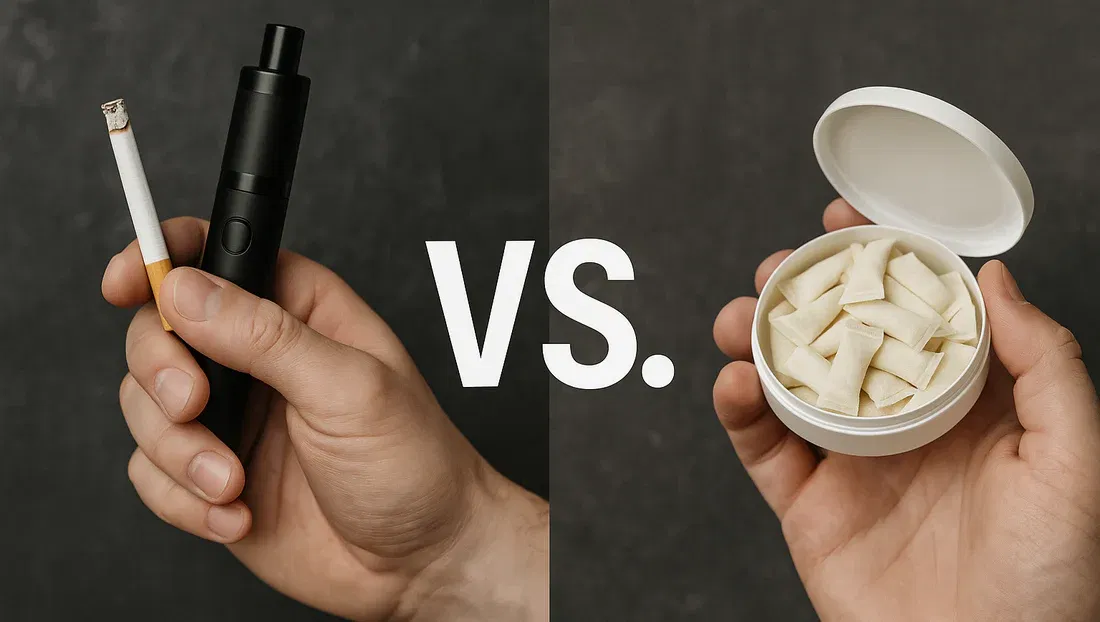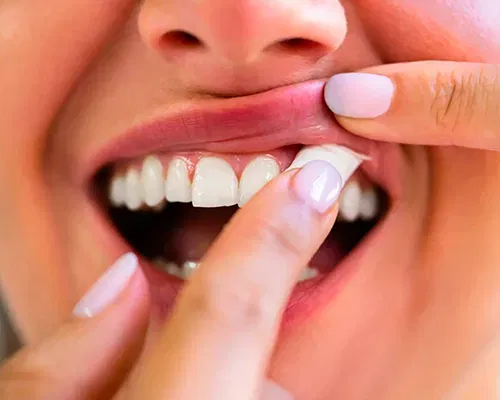
Nicotine pouch effects on gum and oral health: a dental review
Written by
Published
Fri, 31 Jul 2025
Nicotine pouches have emerged as a prominent alternative for nicotine consumption, often marketed as a tobacco-free option. However, their increasing popularity necessitates a closer examination of their potential impact on gum and oral health. This review aims to shed light on the dental implications associated with the use of nicotine pouches, offering insights into the various health risks and effects on oral tissues, gum health, and overall oral hygiene. Understanding these effects is crucial for maintaining good oral health and mitigating potential oral health issues.
Understanding nicotine pouches
How nicotine pouches differ from cigarettes
The primary distinction between nicotine pouches and cigarettes lies in their mode of nicotine delivery and the presence of tobacco. Cigarettes involve the burning of tobacco, leading to the inhalation of numerous harmful chemicals, tar, and carbon monoxide, which contribute to a wide array of severe health risks, including lung cancer, heart disease, and periodontal disease. In contrast, nicotine pouches do not involve combustion, meaning users avoid the harmful byproducts of smoking. However, while they are marketed as a smokeless alternative, nicotine pouches still deliver nicotine directly to the oral cavity, which can have localized effects on gum and oral health. The nicotine content and the impact of nicotine on oral tissues, including the risk of gum disease and gum recession, are still significant considerations when comparing these two forms of nicotine use.

Common ingredients in nicotine products
Nicotine pouch products contain a variety of ingredients beyond just nicotine, all of which can contribute to their overall effects on oral health. While the active ingredient is nicotine, typically in a tobacco-free nicotine form, these oral nicotine pouches also include fillers, flavorings, and pH adjusters. The specific composition can vary between brands, and some ingredients, even those considered food-grade, might cause gum irritation or other oral mucosal reactions upon prolonged contact. The effects of nicotine on oral epithelial cells, coupled with the impact of other chemicals present in these products, can lead to concerns about gum health and the potential development of oral disease. Understanding the full spectrum of ingredients is crucial for assessing the comprehensive oral health effects of using nicotine pouches and their potential contribution to oral health issues over time.
Effects of nicotine on gum health
Impact of nicotine on oral mucosal health
The direct contact of nicotine pouches with the oral mucosa can lead to various localized effects, potentially compromising oral health. The nicotine itself, along with other ingredients present in nicotine pouch products, can irritate the delicate oral tissues. This irritation might manifest as inflammation, redness, or even lesions in the areas where users place nicotine pouches. Prolonged exposure to the high nicotine content in these oral nicotine pouches can alter the cellular structure of oral epithelial cells, potentially increasing the risk of oral mucosal damage. These changes can undermine the protective barrier of the oral cavity, making it more susceptible to infections or other oral health issues. Therefore, the use of nicotine pouches, even without tobacco, poses a distinct set of challenges for maintaining optimal oral health and can lead to adverse effects on the oral mucosal lining.
Risk of gum disease associated with nicotine use
The use of nicotine pouches is strongly associated with an increased risk of gum disease, including gingivitis and more severe forms like periodontal disease. Nicotine is a vasoconstrictor, meaning it reduces blood flow to the gums. This diminished blood supply can compromise the ability of gum tissues to fight off bacteria, making them more vulnerable to infection and inflammation. Furthermore, the constant presence of a nicotine pouch against the gum line can create a localized environment conducive to bacterial accumulation, further exacerbating the risk of gum disease. Users of nicotine pouches may experience symptoms such as bleeding gums, swelling, and tenderness, which are early indicators of gum disease. Without proper oral hygiene and regular dental check-ups, these conditions can progress, leading to more significant oral health issues.
Effects of nicotine on periodontal disease
Nicotine's impact extends beyond initial gum irritation, significantly influencing the progression and severity of periodontal disease. The vasoconstrictive properties of nicotine can mask the early signs of periodontal disease, such as bleeding gums, making it harder for individuals and dental professionals to detect the condition in its initial stages. This delay in diagnosis can allow the disease to advance unchecked, leading to more extensive damage to the supporting structures of the teeth. Furthermore, nicotine can impair the healing process, making it more challenging for individuals with periodontal disease to respond effectively to treatment. Chronic exposure to the effects of nicotine through the use of nicotine pouches can accelerate bone loss and gum recession, ultimately increasing the risk of tooth loss. The overall impact of nicotine on the immune response and tissue regeneration contributes to a more aggressive and difficult-to-manage form of periodontal disease, highlighting the severe oral health effects of using nicotine pouches.

Oral health effects of nicotine pouches
How nicotine pouches cause gum recession
The prolonged and direct contact of nicotine pouches with the gum line is a significant factor in how nicotine pouches cause gum recession. The presence of the nicotine pouch in the oral cavity for extended periods can exert physical pressure on the gum tissues, leading to their gradual displacement from the teeth. Furthermore, the nicotine itself, combined with other ingredients in nicotine pouch products, can irritate the oral mucosa, causing inflammation and breakdown of the delicate gum tissues. This chronic irritation and inflammation contribute to the retraction of the gum margin, exposing more of the tooth surface and root. Over time, this can lead to an increased risk of sensitivity, root decay, and ultimately, a compromised smile and overall oral health. The consistent use of nicotine pouches exacerbates this process, making gum recession a common and concerning oral health issue for users.
Long-term effects of using nicotine pouches
The long-term effects of using nicotine pouches extend beyond immediate irritation and gum recession, posing significant health risks to the entire oral cavity. Chronic exposure to nicotine and other chemicals in these oral nicotine products can alter the cellular structure of oral epithelial cells, potentially increasing the risk of more serious oral health issues, including the development of oral lesions or even, in rare cases, oral cancer. While nicotine pouches are marketed as a tobacco-free nicotine option, the continued impact of nicotine on blood flow and tissue integrity can impede the body's natural healing processes, making users more susceptible to persistent inflammation and infection. Maintaining good oral hygiene becomes increasingly challenging as gum health deteriorates, leading to a higher likelihood of tooth loss and the need for extensive dental interventions. These cumulative effects underscore the importance of understanding the comprehensive oral health effects of using nicotine pouches over prolonged periods.
Comparative analysis: nicotine pouches vs. traditional tobacco products
When conducting a comparative analysis between nicotine pouches and traditional tobacco products like cigarettes or smokeless tobacco, it is crucial to consider the nuances of their oral health effects. While nicotine pouches do not involve combustion, thereby avoiding the harmful byproducts associated with smoking and significantly reducing the risk of lung cancer and other systemic diseases, they still deliver nicotine directly to the oral mucosa. This direct exposure means that the localized impact of nicotine on gum health, including the risk of gum recession and periodontal disease, remains a significant concern, comparable to the effects seen with smokeless tobacco. The absence of tobacco leaf in nicotine pouch products may reduce the risk of certain oral cancers specifically linked to tobacco carcinogens; however, the impact of nicotine on oral tissues, coupled with other ingredients, still presents a unique set of oral health issues. Therefore, while nicotine pouches may be perceived as a "safer" alternative, they are not without their own distinct set of oral health risks, and users should remain vigilant about their dental health.
Maintaining oral health while using nicotine products
Best practices for oral care with nicotine use
Maintaining optimal oral hygiene is paramount for individuals who use nicotine pouches to mitigate the potential oral health issues associated with these products. Given the localized impact of nicotine on the oral mucosa and gum health, it is advisable to rinse the oral cavity with an antimicrobial mouthwash to reduce bacterial load and inflammation. Furthermore, individuals who use nicotine pouches should consider regular dental check-ups and professional cleanings more frequently than those who do not use nicotine products, allowing dental professionals to monitor gum health, detect early signs of gum disease, and address any potential gum recession or other oral health effects promptly. These proactive measures can help to counteract some of the adverse effects of nicotine on oral tissues and maintain good oral hygiene. Users of nicotine pouches should adopt a rigorous oral care routine that includes:
Brushing their teeth at least twice a day with a fluoride toothpaste
Flossing daily to remove plaque and food particles that can accumulate around the gums and teeth.
Signs of gum disease to watch for
Users of nicotine pouches must be particularly vigilant for the signs of gum disease, as the effects of nicotine can sometimes mask early symptoms. Recognizing these symptoms early allows for timely intervention by dental professionals, which is crucial for preventing the progression of serious oral health issues and preserving overall gum health for those who use nicotine pouches. Key indicators of gum disease include:
Red, swollen, or tender gums that may bleed easily during brushing or flossing.
Persistent bad breath.
A change in the fit of dentures or loose teeth.
Any noticeable gum recession, where the gums pull back from the teeth, exposing more of the tooth surface.
Increased tooth sensitivity, particularly to hot or cold temperatures.
Consulting dental professionals for gum health
Regular consultation with dental professionals is indispensable for individuals who use nicotine pouches, especially concerning gum health and the prevention of periodontal disease. Dental professionals can provide comprehensive assessments of the oral cavity, identifying any early signs of gum inflammation, gum recession, or changes in oral epithelial cells that might be linked to the use of nicotine products. They can offer tailored advice and services, including:
Recommendations for specific products that can help protect oral tissues.
Professional cleanings that remove stubborn plaque and tartar deposits that contribute to gum disease.
Initiating appropriate treatments, ranging from deep cleanings (scaling and root planing) to surgical interventions, if signs of periodontal disease are present, to manage the condition and prevent further damage.
Open communication with your dental team about your nicotine product use, including the nicotine content and frequency, allows them to provide the most effective and personalized care, safeguarding your overall oral health.

















